|
John “The Baptist” Gosling was born on 6 February 1948 in Paignton, Devon. He was keyboard player with The Kinks from 1970 until 1978.
In the 1990s, John became a founding member of the Kast Off Kinks until retiring in 2008.
As well as being a terrific keyboard player, Baptist was regarded as the funniest Kink :
KOK : Like Nobby, you were drafted into The Kinks just before an appearance on Top Of The Pops. What was it like being thrust so soon into something as big as ToTP? JG : It wasn’t as big as I’d imagined-the dancers were being herded around the studio to make it look busy, and we were miming to a small speaker on wheels that looked like a prop from Dr Who. It was an interesting and challenging experience, as was the BBC bar where we spent the afternoon.
KOK : Before joining The Kinks, who were your favourite bands? JG : Peter Green’s Fleetwood Mac, The Beatles, The Byrds, The Bonzo Dog Band, Fairport Convention, Neil Young and Crazy Horse, Small Faces, Cream and Hendrix.
KOK : What memories do you have of your audition with The Kinks, and what were your first impressions of your new band mates? JG : It was certainly an education, but I wasn’t made to feel as if I was under any kind of scrutiny. We put down several backing tracks but Ray’s guide vocals gave little indication as to what the songs were about. I think we did versions of Powerman. This time Tomorrow and A Long way from Home, as well as Lola, of course. They seemed such an easy-going bunch of blokes! Dave handed me a beer from a crate in the middle of the room when I walked in and there was no starry behaviour. I remember feeling completely at home-almost as if I’d always been there.
KOK : Almost as soon as you joined the band, you were off on tour to the US and playing your first gig on the 22nd of May 1970 in Minneapolis. How on earth did you manage to learn the piano parts in such a short space of time? JG : There were not that many parts as such. Little riffs and fills that either Ray or Nicky Hopkins had put in. We did have a couple of hasty rehearsals in a room over a pub. I’ve always been a great believer in making live performances sound as close to the recorded versions that everybody knows and loves. For that first gig, I jotted down the chord progressions and arrangements to Shangri-la and a couple of other tricky ones on a scrap of paper which kept falling off the keyboard. My gear broke down halfway through the set, and Nobby has never forgotten me walking up behind him and tapping him on the shoulder for assistance while he was strutting his stuff. I remember there was a girl backstage with a small handgun in her purse-my introduction to the USA!
|
|
“I might have just become a unicorn exterminator!”
The John GOSLING InTerview Part 1 |

|
KOK : According to Doug Hinman's wonderful book, you played a "modest Hohner Pianet" on the first tour - how did you come by this and do you still have it? Was that really all you used on the tour? Actually, I still have a Pianet too. A strange instrument. JG : That Pianet belonged to Ray and he had used it onstage before. It was horrible and totally unreliable. I was glad to see the back of it. In the middle of the tour Ken Jones, our road manager, took me to Manny’s Music Store in New York (The biggest music shop I had ever seen) and we got a keyboard called an RMI that was popular at the time. It had a small collection of useable sounds, and I was able to emulate the stuff on the records more closely. What I really craved was a Hammond B3 organ and a grand piano-but that didn’t happen until a while later.
|
|
KOK : Ray's mellotron doesn't seem to feature much in recordings after you joined the band. Is that because he wouldn't let you near it or was there any other particular reason? JG : I didn’t know he had one. I did play one once, but not on a Kinks recording. It was very Heath Robinson and pretty dreadful. It made a nice cup of tea though. I was one of the first people to use a full-size synthesizer in the studio, it took me all afternoon to get something reasonable out of it and it looked like the London Telephone Exchange. We did a track called ‘Brother’ with it. That was one of the best recordings the band ever did-so atmospheric, everybody played so well. Dave got some beautiful guitar effects going-Ray’s vocal and the lyrics, just matchless.
|
|
KOK : I think in recent times I have mostly seen you playing Technics keyboards – are they your preferred manufacturer? Do you own many keyboards? Can you recall what models you used during your time with The Kinks? JG : Technics was a brand name of Panasonic and they made brilliant Hi Fi s as well as keyboards. I used to sell them in the shop and I have owned five of them. I still have three, two of which I used with the Kast Off Kinks, and also I still have my ancient wooden Korg drawbar keyboard. It’s analogue and sounds like the rude old Hammonds I used to play on tour. With the Kinks, besides some wonderful concert grands, I also used a Fender Rhodes electric piano-which I didn’t enjoy very much.
|
|
KOK : Do you play any other instruments, and have you played anything other than keyboards on any of The Kinks songs? JG : I can play bass and strum a guitar. With The Kinks I also played the marimbas (Apeman, Supersonic Rocketship) and tubular bells (Father Christmas). Mike Oldfield—eat your heart out!
|
|
KOK : You played accordion on the Muswell Hillbillies album. Is that as difficult as it looks? How do you know which of the left-hand buttons is which? JG : It is as difficult as it looks. The left hand buttons produce chords so you have to memorise the right ones for the song. It’s easy to forget to keep the air going in and out when you’re concentrating on the music-I had dear old Ken Jones, our tour manager, helping me with that.
He also lay on the studio floor during the bass drum overdubs for Lola holding the drum still while Mick kicked it a hard as he could. A real trouper. If you look at the Muswell Hillbillies album cover he’s the guy on the right standing by the door keeping a watchful eye on us. |
|
KOK : From Muswell Hillbillies onwards you introduced a harmonium - it's not an instrument that seems closely associated with popular music - what was the inspiration for this, and what is it's finest moment on a Kinks song? JG : Uncle Son I think. Ray’s idea. We had huge problems with recording it because of the bellows groaning and gasping (or was that me? )
My very first keyboard when I was a small boy was a harmonium. It was a Christmas present from my parents. I spent the entire holiday playing carols and making up tunes . I then dismantled it to see how it worked and never managed to re-assemble it.
|
|
KOK : What other players influenced your playing technique or sound? JG : Ian Mclagen of The Small Faces/Faces, Steve Winwood, Matthew Fisher and Paul McCartney. And of course Little Richard and the Big Jezza. |
|
KOK : What other players do you particularly admire? JG : Stevie Wonder, Booker T. Garth Hudson of The Band. Strangely most of my favourites are guitarists-Lowell George, Ry Cooder, Clapton, Hendrix etc. |
|
KOK : You are a classically trained pianist and organist - had you played in any rock bands before joining The Kinks? JG : Just prior to joining them I had a band called Hard Rain and we did mainly blues and Bob Dylan stuff. At the time I was still at the Royal Academy and organist at St Andrew’s, Stoke Newington.
I wrote and performed a version of the Magnificat with the band, the pipe organ, and a choir. We put it on in the church one evening. I had a recording of it on a little reel of tape, but I lent it to someone in The Kinks and never saw it again.
My very first band was called The Challengers. We were formed after my friend and I heard the Kinks doing ‘Long Tall Sally’ on Saturday Club. We made our own instruments and I used to travel to rehearsals with my bass and amp on a motorbike and sidecar! A local school let us use their classrooms-Andy Pyle’s band used to rehearse there too, but we never met.
KOK : I also learned classical piano, and although it was a great way to learn about music, I found it somewhat inhibiting when I started to play rock. Did you feel that way at all? JG : No not really. It’s like opening different doors in your head, and entering the appropriate one. Sometimes it’s possible to combine the two styles but not always advisable! ’A Whiter Shade of Pale’, which is one of my favourite records of all time, managed it beautifully. I experimented a lot until I got that sound, and used it on another favourite ‘Get Back in the Line’.
|
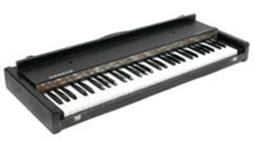
|
Hohner Pianet |
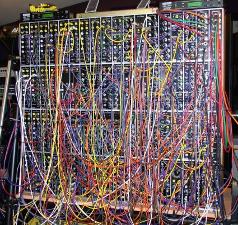
|
A typical 70s synth |


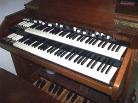
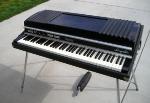
|
Technics |
|
Korg |
|
Hammond |
|
Fender Rhodes |
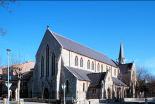
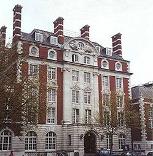
|
St Andrew’s Church |
|
Royal Academy of Music, London |

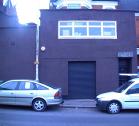
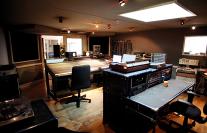
|
Konk Studios |
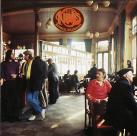
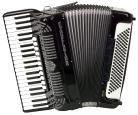
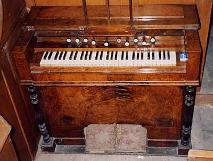
|
Harmonium |












|
KOK : Before you joined the band, Ray had played keyboards, both on some studio recordings and also during live performances - did he ever try to influence your style of playing for the band? JG : Ray always had a an image of the finished song in his head, and so would convey to me the idea of the keyboard style he was after, either by playing riffs or indicating ‘classical’’ bar-room’ or ‘Jerry Lee’. I had been a busker, church organist, pub pianist, done some rock & roll and some blues, which all helped I think.
KOK : You appear to have made your mark on The Kinks sound from the outset, and your contribution is there for all to hear and admire. How much influence do you think you had on the overall sound and direction of The Kinks' sound during your time with them? JG : I think I must have had quite a lot of influence in retrospect, but it wasn’t really intentional-it just seemed that the band’s musical style was mutating just as it did when Ray changed his writing style the first time, and we were all developing together as musicians. At the end of the 60’s it was ‘adapt or die’ I think everyone realised that.
KOK : How much of an input does Ray allow band members to contribute to the sound of a particular record? What input if any did you have with Ray's songs and which ones? Did Ray dictate what you had to play? JG : I would come up with the odd intro or ending and maybe a little run here and there that Ray would give his approval to, but generally he knew what he wanted and was usually able to convey that to us in some way. There was always some room for improvisation.
KOK : What song are you most proud of in terms of your own contribution and or the group as a whole. JG : ’Celluloid Heroes’, without a doubt. It is my favourite Kinks song, too. |
|
KOK : Can you give us an insight of what it was like in the studio? JG : Recording sessions in the early part of the Seventies were more concise. We would convene at Morgan Studios in Willesden and Ray might start strumming a chord sequence and maybe try out fragments of vocal. We would gradually join in once we got the ‘feel’. Dave would usually have his songs complete by the time we eventually recorded them. It was a fun and creative time for all of us.
Once Konk was operational things seemed to change, and Ray rarely seemed happy with anything. We took forever over every track until we eventually ran out of ideas. Sitting through endless overdubs and remixing sessions became terminally boring. I still think we should have had an independent producer. |
|
KOK : What was your favourite album to work on? JG : Muswell Hillbillies.
KOK : If you hadn't joined The Kinks in 1970 how do you think your life would have developed? JG : No idea- but music would have always occupied a major part of it I’m sure. Or I might have just become a unicorn exterminator. |